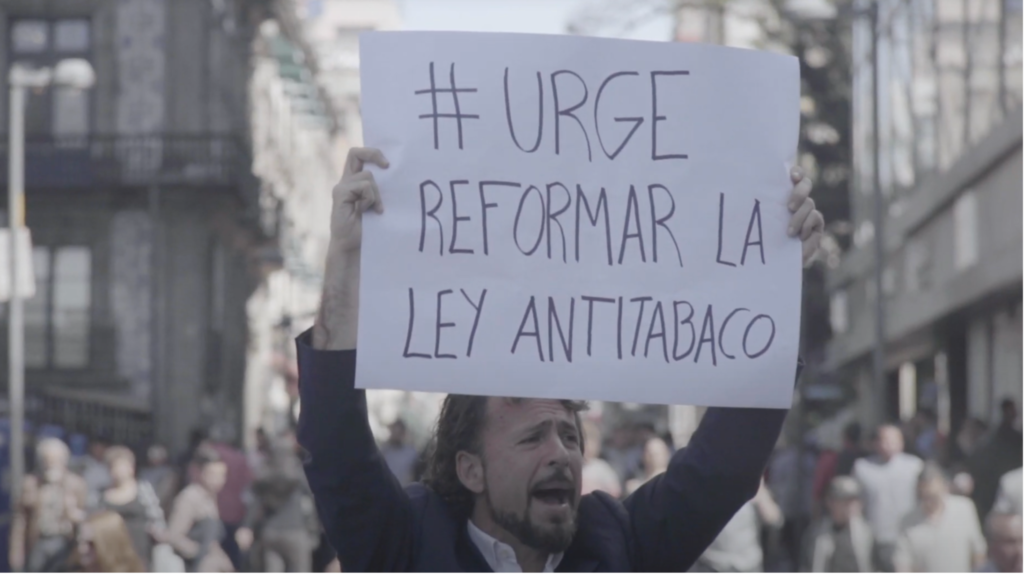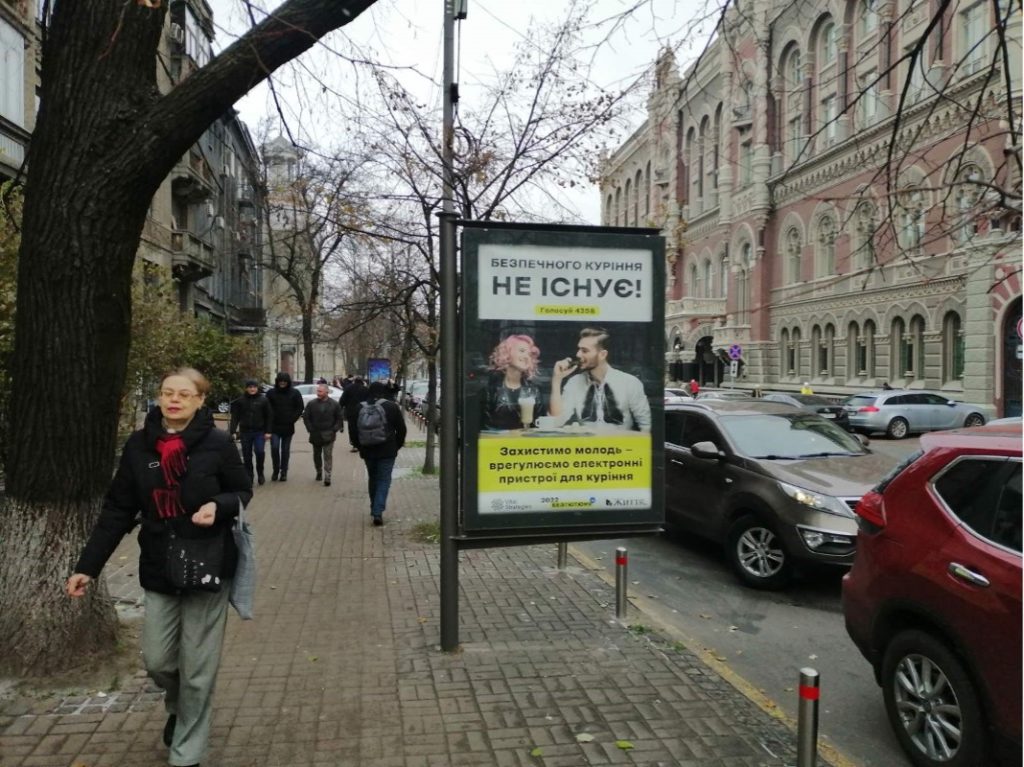What’s one of the best ways to get an energetic start to work in the new year? A boost of momentum from the previous year’s successes. Despite the challenges of 2021, the world saw many significant tobacco control accomplishments, including important efforts in Ukraine, Mexico, Indonesia and China, that will lay the groundwork for more positive change in 2022.
While plenty of work still lies ahead, we on the Tobacco Control team at Vital Strategies, together with our partners, have a lot to celebrate. Here are some of 2021’s successes we’re excited to build on in the new year and beyond.
Get Our Latest Public Health News
Join our email list and be the first to know about our public health news, publications and interviews with experts.
Mexico is going 100% smoke-free in public spaces and fully banned tobacco advertising, promotion and sponsorship.
After a decade-long effort to increase support among policymakers to strengthen tobacco control, build support with the public and fend off tobacco industry opposition, the Mexican Senate unanimously approved amending the national tobacco control law. The amendments will go before a supportive president in 2022.

Prior to these amendments passing, Vital Strategies reached more than 50 million Mexicans via a targeted media campaign, “Cómo te lo explico?” (“How Do I Explain it to You?”) on TV and radio and in newspapers to help build support. The team worked closely with local media to set up interviews for partners with popular national TV and radio hosts, such as Eduardo Ruiz-Healy, a well-known anchor at the national level. The team also bolstered the overall campaign with a focused social media effort.
These latest amendments will ensure that everyone in Mexico can enjoy public spaces without exposure to secondhand smoke. They also stand to protect the population, especially young people, from various forms of industry marketing.
Indonesia is raising tobacco prices to discourage use.
At the end of 2021, the Indonesian government announced tobacco tax increases to 12% on all tobacco products and up to 14.4% on premium brands, with the law to take effect in January 2022. Vital Strategies played an important role in this win, sharing a drumbeat of social media campaigns designed by Vital and partners, that amplified the economic cost of tobacco use.
Also in Indonesia, after years of support from Vital Strategies and the Partnership for Healthy Cities, Bandung, Indonesia, implemented smoke-free polices in seven types of public places, including playgrounds and places of worship, to protect non-smokers and children.
A post from our #SuaraTanpaRokok (“Voices Without Cigarettes”) social media campaign in Indonesia, that compares tobacco consumption by socioeconomic group.
In Ukraine, e-cigarettes and other alternative products will be regulated the same way as conventional cigarettes.
Many tobacco companies are holding onto the hope that addiction to their new electronic products, such as e-cigarettes and heated tobacco products, will be their lifeline to future profits. But tobacco control efforts in Ukraine will help ensure that people get the same protection from these new products—the long-term health effects of which are still unknown—as they do from cigarettes.
In 2021, Parliament passed a national tobacco control law that bans use of these new products in enclosed public spaces, bans flavors (which are known to appeal to young people), including menthol, and restricts sales to minors.
The new law also bans the advertising of e-cigarettes and other products and requires pictorial health warnings to increase to 65% on both sides of cigarette and e-cigarette packages. Despite tobacco companies’ attempts to weaken and delay the law, the Ukrainian government championed public health over the tobacco industry’s interests.
From 2020 to 2021, the National Public Health Center of Ukraine’s Ministry of Health ran a series of campaigns to build support and urgency for the law, with technical support from Vital Strategies. The “No Safe Smoking” campaign showed how the tobacco industry is using decades-old marketing tactics to convince young people that newer tobacco products are cool, while hiding the health risks they pose. The campaign was developed based on online message testing that Vital Strategies conducted with young Ukrainians.
“A Doctor’s Warning” was a campaign that featured a prominent and politically active oncologist warning about the harms of e-cigarettes and calling for their regulation. As part of the social media campaign, he activated 10 doctor-bloggers to raise awareness of the issue and support the parliamentary Health Committee. This blitz generated 22 publications, and nearly 50,000 reactions (likes, shares and comments). Both campaigns aired on national television, leveraging a law that requires free mandatory airtime for public service announcements on strategic public health issues. They also aired nationally along the railways, and reinforced by Kiev city council by placement in subways and through other outdoor media. For the young and active, Vital Strategies collaborated with leading podcasts to produce programs to reveal industry manipulation tactics. To support this work, “Smoking Sucks” stickers were created for audiences of the messaging app Telegram.

China celebrated declines in smoking rates and secondhand smoke exposure, as well as successful implementation of WHO FCTC-compliant smoke-free standards.
Data from a 2021 China National Health Commission (NHC) report suggests a promising 2022 and beyond for tobacco control. Chiefly, 17 cities and two provinces implemented the smoke-free standards of the WHO Framework Convention on Tobacco Control (WHO FCTC), which includes 100% smoke-free workplaces. This achievement will help accelerate the declining rate of secondhand smoke exposure, which dropped 11.5% between 2018 and 2020. The new smoke-free standards will protect roughly 15% of the country’s population, or about 213 million people. Also encouraging, smoking rates overall declined from 26.6% in 2018 to 25.8% in 2020. Beijing, specifically, narrowly achieved Healthy Beijing Action’s 2022 goal of an under 20% smoking rate for those 15 and older.
To support these achievements, Vital Strategies provided funding and technical support to help local partners optimize their media campaigns. In Hangzhuo, for example, our work with local partners helped increase public awareness about the new smoke-free law and support for its enforcement. Our teams also worked with the NHC to gather smoke-free best practices from 10 key smoke-free cities, which were published on the NHC’s national WeChat account.

Other global wins in 2021 will drive more positive change in 2022.
Turkey is now tied with Timor-Leste for the world’s largest cigarette pack health warnings. In 2021, the country announced the new requirement that health warnings take up 92.5% of cigarette packaging. Warning label progress occurred in the Philippines as well, as new warning labels for e-cigarettes and heated tobacco products were created, with technical assistance from Vital Strategies.
Regulators also became more empowered in 2021. Brazilian regulators now have the power to ban the use of additives, thanks to a unanimous Federal Regional Court ruling. Prior to this ruling, the regulation had been in place, but was not binding at a national level. Further, thousands of local jurisdictions in Bangladesh have been called upon to plan, implement and enforce tobacco control policies, per new national guidelines.
Major reports will help carry out meaningful work in 2022.
Our tobacco control achievements in 2021 lay the groundwork to inform and support our work in 2022 and beyond. For example, policymakers working to reduce tobacco industry interference may now benefit from the 2021 Global Tobacco Industry Interference Index; this helpful guide was created by STOP (Stopping Tobacco Organizations and Products), in which Vital Strategies is a partner. The Index highlights levels of industry interference across 80 countries and offers suggestions for how governments may counter it.
And to quell online bidi marketing in India, which skirts the country’s current tobacco control law, our Tobacco Enforcement & Reporting Movement (TERM) report, “Selling Death on Social Media: How Bidis Are Reaching Consumers Online” will prove to be an in-depth resource.
As we begin a new year, we not only celebrate the accomplishments of 2021 to which Vital Strategies contributed, we see them as inspiration for what’s possible. We look forward to working with our partners on a productive and successful 2022!
Learn more about our tobacco control work here and here, follow us on Twitter @VitalStrat and stay up to date on the latest in tobacco control by signing up for our newsletter.
About Vital Strategies’ work in tobacco control:
Vital Strategies works in more than 40 countries to support the adoption of proven policies to reduce tobacco use. Our global team of experts use policy, advocacy and strategic communication to help governments adopt lifesaving, public health “best buys” like comprehensive smoke-free laws and high tobacco taxes.
Our evidence-based public education campaigns have been seen by more than 2 billion people around the world. We partnered with the American Cancer Society to produce The Tobacco Atlas (sixth ed.), the most comprehensive report on the evolving global tobacco epidemic, and support production of WHO’s MPOWER reports.
Vital Strategies is a main partner in the $1 billion Bloomberg Initiative to Reduce Tobacco Use, and a partner in the global tobacco industry watchdog, Stopping Tobacco Organizations and Products (STOP).